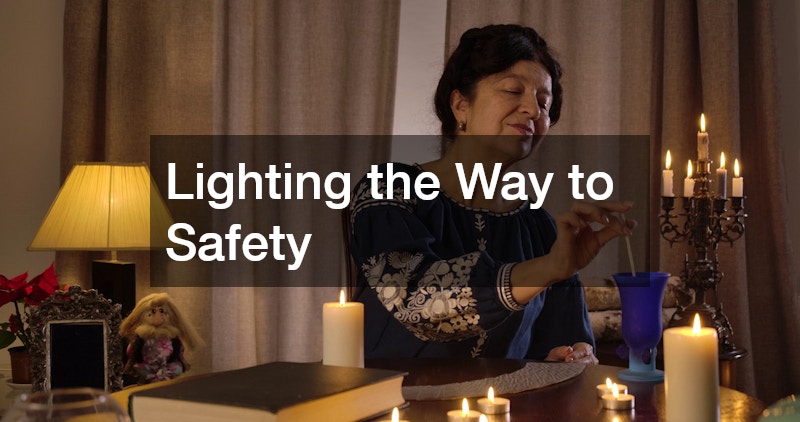Home renovations can be a stressful experience for anyone, but they can be particularly challenging for elderly individuals. With noise, dust, movement limitations, and temporary disruptions to daily routines, seniors often struggle with maintaining comfort and safety during these periods. Family members who are overseeing or managing these renovations must consider more than just the aesthetic improvements or the long-term functionality of the space—they must also prioritize the day-to-day well-being of their aging loved ones. Whether the project is large or small, ensuring elderly individuals remain safe, comfortable, and independent throughout the process requires proactive planning and thoughtful decision-making.
Elderly people may be sensitive to changes in routine, temperature fluctuations, or lack of access to essential areas like kitchens and bathrooms. The renovation environment can quickly become dangerous with tools, loose cords, or obstructed walkways. This is where the inclusion of supportive and adaptive items can make a substantial difference. These helpful items for elderly loved ones can be as simple as motion-sensing lights or as robust as temporary handrails and protective barriers. Each solution can serve a dual purpose—protecting your loved one while supporting the renovation team by minimizing potential hazards and liabilities.
This blog will explore a variety of ways to integrate practical support for seniors during home renovations. From communication strategies with contractors to choosing temporary adaptive furnishings, the goal is to provide guidance that helps family members navigate this unique situation. Thoughtful preparation and an understanding of what elderly individuals truly need can transform an overwhelming renovation process into one that is safe, empowering, and even enjoyable.
1. Lighting the Way to Safety

During home renovations, lighting becomes more important than ever. Poor visibility can lead to dangerous slips, trips, or confusion. Installing additional lighting options such as portable lamps or motion-sensor lights can go a long way. These additions are particularly beneficial for seniors who may already suffer from impaired vision. Not only do they provide clarity in dim hallways or transitional areas, but they also help maintain independence.
Among the most helpful items for elderly loved ones are plug-in night lights and touch lamps. These tools reduce the chances of an accident in unfamiliar or altered surroundings. With renovation workers coming and going, it’s easy for a home to look different from day to day. Adequate lighting creates continuity and reassurance for seniors who may be affected by frequent change.
2. Reducing Bathroom Hazards
Bathrooms are already high-risk zones for the elderly, and during a renovation, that risk multiplies. When standard features like tubs, toilets, or sinks are being replaced or upgraded, temporary bathroom setups should be established with senior safety in mind. Portable toilets, shower chairs, and raised toilet seats are just a few of the helpful items for elderly individuals that can ease this transition.
Bathroom remodelers can provide insight into which temporary features are best suited for older adults. For example, they may suggest installing handrails or anti-slip mats in temporary or secondary bathrooms. These additions offer much-needed security while the main bathroom is under construction.
Temporary setups should also consider accessibility—ensure that paths to and from the bathroom are clear and well-lit. If your elderly loved one uses mobility aids like a walker or wheelchair, make sure doorways are wide enough and free of obstacles. Prioritizing bathroom safety isn’t just about convenience—it’s a critical factor in preventing injuries.
Installing helpful items for elderly loved ones during bathroom remodeling isn’t just a practical choice—it’s an act of compassion that ensures their dignity and well-being remain intact throughout the process.
3. Kitchen Accessibility During Renovations
Kitchen renovations often take several weeks, which can severely disrupt an elderly person’s daily routine. During this period, it’s essential to set up an accessible temporary kitchen space. This space should include a microwave, a small refrigerator, and other appliances that are easy for seniors to use.
Kitchen contractors can advise on the layout of the temporary kitchen area to ensure it’s safe and navigable. Seniors should not have to reach high shelves or carry hot liquids over long distances. Countertop space should be kept clear and at an appropriate height. Safety items such as slip-resistant mats and lightweight cookware are also helpful items for elderly loved ones.
A comfortable chair nearby can also provide support while waiting for food or medications. Many seniors need multiple small meals and hydration throughout the day, so access and ease of use are key. A well-thought-out temporary kitchen empowers elderly individuals to maintain their nutritional habits and independence.
Communication with kitchen contractors about the needs of elderly residents is vital. They may be able to work on one section at a time or prioritize accessibility improvements first, minimizing disruption.
4. Comfortable Flooring Solutions

Home renovations can create uneven or unfinished floors that are risky for elderly individuals. Temporary floor coverings like non-slip mats, carpet tiles, and foam padding can minimize the likelihood of tripping or slipping. Even if your flooring company is mid-project, these interim measures should be implemented.
Older adults often experience balance issues or slower reaction times, so walking over unsteady surfaces becomes a serious concern. One of the most helpful items for elderly loved ones is a reliable walking surface. This includes clearly defined walkways and marked thresholds where flooring height may differ.
During active flooring installation, you can create alternative pathways using rugs with anti-slip backings or temporary ramps. Alert your flooring company in advance to the mobility needs of any seniors in the home so they can plan accordingly. They may be able to segment the job or recommend quicker-setting materials that allow for faster transitions.
Avoid temporary thresholds or step-ups that can trip someone using a cane or walker. Smooth, level surfaces are key, even if they’re only temporary. Flooring isn’t just cosmetic—it plays a direct role in daily safety and comfort for seniors during renovation work.
5. Thoughtful Cabinet Adjustments
Cabinets are an essential part of kitchens, bathrooms, and even hallways, and cabinet work during renovations can limit access to necessary items. A cabinet company can help you set up temporary or modular storage that keeps essentials within reach.
Many elderly individuals have difficulty reaching high or low cabinets, especially when recovering from surgery or dealing with joint pain. Installing rolling carts or open-shelf units at waist height are helpful items for elderly loved ones that ensure day-to-day convenience during construction.
Communication with your cabinet company about these needs early in the process is key. They may be able to suggest products that double as permanent and temporary solutions. Magnetic locks, soft-close mechanisms, and adjustable shelving can reduce strain and support long-term aging in place.
Clear labeling of temporary storage areas is also useful for seniors with cognitive decline. This prevents confusion and encourages independence, even when the permanent cabinets are being upgraded.
6. Air Quality and Noise Control
Renovations stir up dust, fumes, and continuous noise—factors that can significantly affect the health of elderly individuals. Maintaining indoor air quality and reducing noise are often overlooked yet highly helpful items for elderly loved ones.
Portable HEPA air purifiers can reduce airborne contaminants, especially when drywall is being sanded or new flooring is installed. Seniors with respiratory issues, asthma, or weakened immune systems benefit greatly from cleaner air.
Noise-canceling headphones or white noise machines may also offer relief from the chaos of drills and hammers. Seniors who are sensitive to noise, or those with dementia, can become anxious or agitated in loud environments. Having a quiet, designated retreat area with soft lighting and calming sounds can make all the difference.
Creating a schedule that outlines high-noise periods allows your elderly loved one to plan naps, medication times, or outings around them. Ensuring environmental peace and health during a renovation is one of the simplest ways to show care and attention.
7. Climate Comfort and Ventilation

Maintaining a comfortable indoor climate during renovations is crucial, particularly for seniors who are more susceptible to temperature fluctuations. HVAC contractors can help ensure heating and cooling systems remain functional even when walls are being opened or ducts are being moved.
Helpful items for elderly loved ones in this case may include space heaters, cooling fans, and temperature-regulating bedding. Seniors often have different thermal comfort needs than younger adults, and something as simple as a draft from an open window can lead to health concerns.
It’s wise to have HVAC contractors inspect and maintain existing systems before a renovation begins. This ensures continued climate control and proper airflow throughout the home. Some projects may benefit from installing temporary ducts or portable air conditioners in living quarters.
Proper ventilation also helps to reduce the spread of renovation dust and fumes, improving both comfort and safety for elderly individuals who may be spending much of their time indoors during the remodel.
8. Emergency Access and Mobility Considerations
Mobility during home renovations can become a major concern, especially if major walkways or staircases are blocked. One essential task is ensuring that seniors can still safely enter and exit their homes. A temporary garage door solution can be a surprising yet critical component.
If a renovation affects the main entrance or hallways, the garage door might become the most viable path for emergency access. Helpful items for elderly loved ones in this situation include portable ramps, grab bars, and handheld radios for communication.
Contractors working near the garage area should be informed of mobility concerns. Consider marking safe routes with clear signage or non-slip tape. Automatic garage door openers can also be adjusted to operate more slowly, giving seniors extra time to exit.
Simple safety enhancements go a long way when rethinking mobility routes during home renovations. These temporary adjustments preserve both independence and security.
9. Safeguarding Plumbing Fixtures
Plumbing systems are often disrupted during a renovation, especially in kitchens and bathrooms. Ensuring that seniors still have consistent access to clean water is critical. Sink repair and plumbing maintenance must be timed carefully to avoid major inconvenience.
Coordinate with your plumber or sink repair service provider to maintain working fixtures in at least one location in the home. Clearly communicating your elderly loved one’s routine can help professionals work more efficiently and minimize downtime.
Water leaks or changes in pressure can also pose a hazard. Slip-resistant mats and accessible water shutoff instructions can mitigate risks in case of emergency. With the right preparation, plumbing interruptions don’t have to interfere with your elderly family member’s comfort and well-being.
10. The Emotional Component

Elderly individuals often struggle with change, particularly when it disrupts long-standing routines and the familiarity of their home environment. One of the most helpful items for elderly loved ones isn’t a product but a plan for emotional support.
Creating a safe, quiet space away from the renovation zone is one way to ease emotional strain. Introduce familiar objects, favorite books, or cherished photos to maintain a sense of normalcy. Daily check-ins, phone calls with relatives, and scheduled breaks from the noise and clutter provide essential emotional care.
Listening and validating concerns can also go a long way. Offering choices in small decisions—like where a chair is placed or what time a meal is served—helps seniors retain a sense of control.
Preparing them emotionally before the renovation begins by showing them plans, timelines, and photos of the end result helps reduce uncertainty. Emotional support is just as crucial as physical assistance when helping elderly loved ones navigate the stresses of home renovations.
11. Aesthetic Changes
Interior updates during renovations don’t just need to look good—they should enhance comfort and accessibility. Working with interior design services can help you select furniture, layouts, and decor that prioritize elderly comfort while elevating the home’s appeal.
Design isn’t just about visuals. Properly chosen window coverings can regulate temperature and reduce glare. Wall-mounted shelves or under-bed storage options reduce clutter and support day-to-day ease.
When selecting finishes and materials, opt for low-VOC paints and hypoallergenic fabrics. These reduce respiratory triggers, especially important during and after construction. Thoughtful design is the final layer of comfort, bridging safety with beauty.
12. Coordinating Services
Managing multiple contractors— roofing services, electricians, HVAC professionals, and designers—can become overwhelming. To ensure the renovation process is smooth for your elderly loved one, it’s crucial to coordinate services efficiently and minimize overlap.
If roofing services are scheduled, ensure that vibrations and sounds are anticipated. When electricians are at work, turn off unnecessary equipment and provide alternatives. Communication is key—letting your elderly loved one know what to expect each day can help them feel more in control.
Providing advance notice and ensuring there’s always a quiet, clean retreat space makes the entire process more manageable. By organizing and communicating effectively, you provide your elderly loved one with a sense of security and control throughout the renovation.
Helping an elderly loved one through a home renovation takes more than managing materials and timelines—it takes empathy, planning, and a deep commitment to their safety and comfort. Throughout this blog, we’ve explored a wide range of helpful items for elderly individuals, from physical supports like grab bars and rolling carts to environmental aids like air purifiers and lighting adjustments.
We’ve also touched on the importance of working closely with professionals—like electricians, flooring companies, and kitchen contractors—who can help you tailor temporary solutions that address unique mobility and comfort needs. Ensuring your senior family member has consistent access to safe plumbing through sink repair, maintains a comfortable climate with HVAC contractors, and benefits from thoughtful layouts by interior design services is what transforms a chaotic renovation into a supported experience.
By planning ahead and embracing adaptive strategies, you can ensure that your home improvement journey is a positive one for every member of the family—especially those who need it most.
